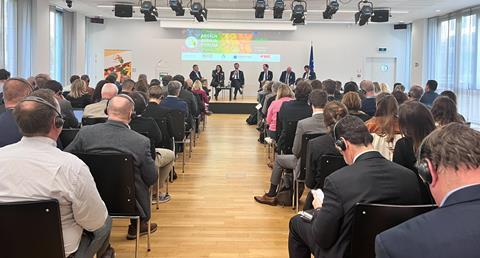CAP reform and plant protection products amongst the main topics discussed at the event
The Assembly of European Horticultural Regions (AREFLH) held its second Annual Forum this week in Emilia-Romagna, Italy. It reported strong participation from producer organisations and regions, and fruitful exchanges with EU institutional representatives.

The forum opened with remarks from Alessio Mammi, Minister of Agriculture and European Affairs of Emilia-Romagna and host of the event, and Ramón Fernández-Pacheco, president of AREFLH and Minister of Agriculture of Andalusia. Both urged the EU to better listen to the voices of regions and producers.
Keynote speaker Professor Paolo De Castro warned that European horticulture is under pressure due to stringent requirements on plant protection and unfair competition from countries outside the EU.
He called on the European Commission to promote mutual recognition of plant protection products and establish EU-wide rules on gene editing, stressing that “the world is not waiting – Europe must defend its agri-food sector, its leading export industry”.
The discussion then moved on to a dynamic first panel on the role of sectoral interventions in the future Common Agricultural Policy. MEP Carmen Crespo made her position clear: “The current proposal should be sent back to the drawing board”.
Both she and Eric Sargiacomo urged the European Commission to abandon the idea of a single fund. “The European Defence Strategy cannot be built at the expense of European farmers,” Crespo warned, while Sargiacomo added: “Delegating all responsibilities to member states has already proven to be a failed strategy. We ask for greater respect for the Parliament’s voice in the interinstitutional dialogue”.
Representing the European Commission, Ricard Ramon responded that the new mechanism of shared responsibility with member states would be designed to avoid harming well-functioning sectors such as fruit and vegetables.
AREFLH president Fernández-Pacheco countered that “the CAP is losing its soul within this single fund, and that is not acceptable. The CMO is much more than income support – it is a democratic system for planning production and investing collectively to strengthen farmers’ resilience within the value chain.”
His words resonated with Arnaud Lécuyer, vice-president of Brittany, who cautioned that “this proposal increases the risk of inequalities among regions – Europe must remain close to its citizens”.
Innovation and sustainability of plant protection: A race against time
The second part of the conference focused on innovation as a cornerstone of sustainable plant protection. Producers’ concerns over pest management require a pragmatic and proactive approach, as underlined by Corrado Finardi, director of regulatory affairs at CropLife Europe.
The debate gained momentum around two key solutions under discussion. Representing the European Commission, Sirkku Heinimaa presented the latest progress in interinstitutional negotiations on the New Genomic Techniques (NGT) regulation.
MEP Alexander Bernhuber welcomed Parliament’s compromise on the biological control report, stressing that “our priority is to speed up authorisation processes. Farmers keep losing available substances, while approving more sustainable control solutions can take up to 10 years, farmers do not have that time”.
Michaël Braekman, senior advisor at the Region of Flanders, noted that while research is fundamental, “it takes time, and we regret that in the meantime uniform implementation of plant protection rules is declining across Europe”.
AREFLH vice president Lisa Martini reaffirmed the importance of operational programmes as “the key instrument to bring modern and sustainable techniques into real practice”.
Closing the conference, Fernández-Pacheco stated: “The forum has once again proven to be a dynamic platform for shaping concrete solutions and reaffirming a shared ambition for European horticulture”



